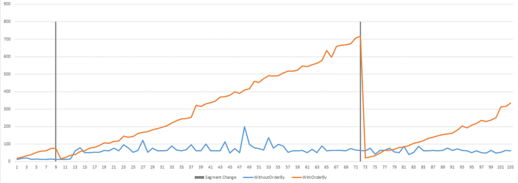AW: Performance issue with order by clause on - Mailing list pgsql-performance
| From | Stephan Schmidt |
|---|---|
| Subject | AW: Performance issue with order by clause on |
| Date | |
| Msg-id | BN7PR08MB430732C39DE10A7E6A19A170E8410@BN7PR08MB4307.namprd08.prod.outlook.com Whole thread Raw |
| In response to | Re: Performance issue with order by clause on (Corey Huinker <corey.huinker@gmail.com>) |
| List | pgsql-performance |
Have you tried creating an sorted index like
CREATE INDEX table_modificationtime_idx ON “TABLE“ USING btree(modificationtime DESC) WHERE (enabled=1)?
Best Regards
Stephan
Von: Corey Huinker
Gesendet: Mittwoch, 20. März 2019 18:34
An: Maracska Ádám
Cc: pgsql-performance@postgresql.org
Betreff: Re: Performance issue with order by clause on
On Wed, Mar 20, 2019 at 9:36 AM Maracska Ádám <csuszmusz@gmail.com> wrote:
Hi,
I would like to overcome an issue which occurs only in case with order by clause.
Details:
I am trying to insert into a temporary table 50 rows from a joined table ordered by a modification time column which is inserted by the current time so it is ordered ascending.
Each table has index on the following columns: PRIMARY KEY(SystemID, ObjectID, ElementID, ModificationTime)
Statement:
sqlString := 'INSERT INTO ResultTable (
SELECT * FROM "TABLE" a LEFT OUTER JOIN "TABLE_Text" l1031 ON a.ModificationTime = l1031.ModificationTime AND a.SystemID = l1031.SystemID AND a.ObjectID = l1031.ObjectID AND a.ElementID = l1031.ElementID AND l1031.LCID = 1031 LEFT OUTER JOIN ( SELECT * AS CommentNumber FROM "TABLE_Comment" v1 GROUP BY v1.ModificationTime, v1.SystemID, v1.ObjectID, v1.ElementID ) c ON a.ModificationTime = c.ModificationTime AND a.SystemID = c.SystemID AND a.ObjectID = c.ObjectID AND a.ElementID = c.ElementID WHERE a.ModificationTime BETWEEN $1 AND $2 AND ( a.Enabled = 1 ) ORDER BY a.ModificationTime DESC LIMIT 50));
EXECUTE sqlString USING StartTime,EndTime;
node type
count
sum of times
% of query
Hash
1
8.844 ms
10.0 %
Hash Left Join
1
33.715 ms
38.0 %
Insert
1
0.734 ms
0.8 %
Limit
1
0.003 ms
0.0 %
Seq Scan
2
22.735 ms
25.6 %
Sort
1
22.571 ms
25.5 %
Subquery Scan
1
0.046 ms
0.1 %
Execution Plan: https://explain.depesz.com/s/S96g (Obfuscated)
If I remove the order by clause I get the following results:
node type
count
sum of times
% of query
Index Scan
2
27.632 ms
94.9 %
Insert
1
0.848 ms
2.9 %
Limit
1
0.023 ms
0.1 %
Merge Left Join
1
0.423 ms
1.5 %
Result
1
0.000 ms
0.0 %
Subquery Scan
1
0.186 ms
0.6 %
Which is pointing me to a problem with the sorting. Is there any way that I could improve the performance with order by clause?
To make the problem more transparent I ran a long run test where you can see that with order by clause the performance is linearly getting worse:
Postgresql version: "PostgreSQL 11.1, compiled by Visual C++ build 1914, 64-bit"
Istalled by: With EnterpriseDB One-click installer from EDB's offical site.
Postgresql.conf changes: Used pgtune suggestions:
# DB Version: 11
# OS Type: windows
# DB Type: desktop
# Total Memory (RAM): 8 GB
# CPUs num: 4
# Connections num: 25
# Data Storage: hdd
max_connections = 25
shared_buffers = 512MB
effective_cache_size = 2GB
maintenance_work_mem = 512MB
checkpoint_completion_target = 0.5
wal_buffers = 16MB
default_statistics_target = 100
random_page_cost = 4
work_mem = 8738kB
min_wal_size = 100MB
max_wal_size = 1GB
max_worker_processes = 4
max_parallel_workers_per_gather = 2
max_parallel_workers = 4
Operating System: Windows 10 x64, Version: 1607
Thanks in advance,
Best Regards,
Tom Nay
The queries are not equivalent. One returns the first 50 rows it finds regardless of what qualities they possess, and the other one must fetch all rows and then decide which 50 are the most recent.
They're the difference between:
Find any 10 people in your city.
Find the TALLEST 10 people in your city. This will scale poorly in large cities.
If you have an index on ModificationTime, then the query can seek to the highest row matching the between clause, and walk backwards looking for rows that match any other criteria, so that will help, because it will avoid the sort.
Attachment
pgsql-performance by date:


